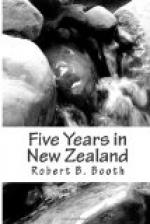However, we all survived, and were none the worse, and as soon as it was light we gathered enough brushwood to make a rousing fire, by which we melted the frozen snow and ice from our blankets, and from the harness before we could put it on the horses.
We soon finished a hearty breakfast of mutton grilled in the hot ashes, and hot tea, and proceeded to get ready for the day’s work, which we knew would be a heavy one if we were to get over the pass before sundown.
It was two miles to the top, but such a two miles to take a horse dray over. The gradient was not only very steep and rough, but it was covered with six to eighteen inches of snow, except in some few exposed parts where it had drifted off and left the surface nearly bare. There was no track to guide us beyond a very uncertain and irregular one made by a few pedestrians and horses who had preceded us the evening before when we had been delayed by the drays.
We decided to take the drays over separately, yoking all four horses to each in turn, tandem fashion, by means of ropes with which we were well provided. Just as we were about to start the first, a party of diggers arrived, who volunteered to push and spoke the wheels. Thanks to these men and the game, honest horses, our difficulties were considerably lightened. Some went before to clear the snow where it lay thickest, but this was soon abandoned as labour in vain.
We found that the utmost efforts of the four horses, assisted by half a dozen men, were only sufficient to drag the dray from twenty to fifty yards at a spurt, then on stopping to take a breath a log was thrown behind the wheels, and after a few moments’ rest another spurt was made, and so on.
Our progress was so satisfactory that before nightfall both drays were safely over the pass and we had proceeded down the opposite side as far as an out-station of McLean’s, on whose run we now were. Here we learned to our joy that we were within twenty-five miles of the reported diggings, with a fairly passable track all the way.
Mr. R. McLean was a wealthy sheep farmer who had originally made his money on the Australian goldfields. His present attitude therefore towards the diggers was considered the more cruel. He had given orders at all his out-stations that neither food nor shelter was to be afforded them, and upon our arrival at the shepherd’s hut aforesaid, the occupant, a worthy Scotsman, informed us with regret that we would have to arrange for our accommodation in the open, it being as much as his place was worth to feed or shelter diggers. This was unpleasant news, as we hoped to have taken up our quarters in his hut that night after our severe camping out the previous four days.
Although the diggings broke out in McLean’s run he had no power to prevent the land being worked upon, excepting only such portions of it as were private property, but he discouraged and put obstacles in the way of the diggers in any form he could, some said because he knew as an experienced digger himself that they would not pay. Whether this was the case or not, he might have understood the impossibility of stopping a gold rush in its infancy, while its value was still an unknown quantity.




